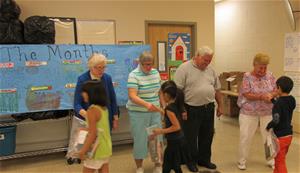 Aretha Eldridge Williams used to gather struggling readers around a table for a lesson—not just any classroom table, but one supplied with cartons of milk and apple turnover snacks she’d bring from home. A free breakfast program was not yet available to students in the Jefferson Parish Public School System in Louisiana, where she taught.
Aretha Eldridge Williams used to gather struggling readers around a table for a lesson—not just any classroom table, but one supplied with cartons of milk and apple turnover snacks she’d bring from home. A free breakfast program was not yet available to students in the Jefferson Parish Public School System in Louisiana, where she taught.
So when the International Literacy Association (ILA) and the National Association of State Title I Directors partnered to create a new Read and Feed program and Williams was asked if she was interested in piloting it at Jefferson schools, she knew she wanted to help.
“Before children can learn, they have to have something in their stomach,” says the retired principal and longtime literacy advocate, who’s now the Louisiana Reading Association (LRA) District 6 director.
The Read and Feed program, which provided literacy activities as a supplement to child nutrition services, was piloted in two Title I schools in Louisiana and one in Illinois this past summer. Another program is taking place this winter in Missouri with hundreds of books donated by exhibitors at the ILA 2015 Conference in St. Louis.
This program is a natural fit for the two organizations, given Title I’s dedication to language arts and ILA’s mission to bring literacy initiatives into the areas where they are most needed.
“By bringing literacy materials and donated books to students in these schools, and making sure they can count on nutritious meals during their school breaks, we’re ensuring they have the kind of consistency they need to achieve in school,” says ILA Associate Executive Director Stephen Sye. “We’re helping to create happy, healthy readers.”
Feeding stomachs and minds
Jefferson Parish, which serves communities near New Orleans, is divided by the Mississippi River. Williams worked with schools on the east and west banks: Granville T. Woods Elementary in Kenner, and McDonogh No. 26 Elementary in Gretna.
About 110 K–4 students were already participating in existing half-day summer programs at the two schools, which are held in July to help combat the summer slide.
“Connecting Read and Feed with our summer programs really provided the benefits that they need and targeted it to students that need the interventions,” Williams says.
Without designated funds, Williams began contacting vendors such as Scholastic and a book seller specializing in school libraries for donations. She sought new hardbacks for reading levels between pre–K and eighth grade and collected 423 books.
During the summer program’s lunch period, LRA members read stories, distributed books, and handed out family resources, including a calendar with suggested at-home reading activities.
The program was so successful, says LRA state coordinator Gerri Settoon, that the council plans to expand it soon. “We’re hoping to have it in every parish we possibly can.”
In Illinois, ILA State Coordinator Roberta Sejnost also hopes to see the program expand. In its first year, she says, the West Suburban Reading Council worked with an existing summer school program as well, one that targets specialized instruction to third graders at the Maywood-Melrose Park-Broadview School District 89, located just west of Chicago.
Their Read and Feed program, coordinated by Kathleen Sweeney and Barbara Ashton, was designed to provide literacy activities for approximately 30 students during their regular four-week summer program. “Our part was to provide the literacy activities that correlated with the district’s curriculum and could be taken home for students to use in the evenings and weekends,” Sejnost says.
Teachers across Illinois provided activities with a focus on writing, poetry, and vocabulary that students could do all summer long.
The West Suburban Reading Council also collected books. In all, about 300 were also purchased with money raised by the Illinois and Illini reading councils.
Lasting beyond summer
In both states, the children were sent home with a collection of books to keep at the end of the programs.
“Mini libraries,” which contained seven books with a mix of fiction and nonfiction, were distributed in Illinois in a celebration that included student poetry readings and assignments displayed on classroom walls.
The hope is that the excitement will continue and the students’ love of literature will last beyond the end of summer—both in school and at home.
“We wanted to keep it simple,” says Bob Harmon, CEO of the National Title I Association, of the joint initiative. “Our objective is to have kids read good, quality literature. And even just read. As simple as that—just read.”
Sye agrees and stresses it is a simple way not only to get kids hooked on reading, but also for ILA councils to make a mark in their community.
“This is a way for us to reach out and bring our resources and our expertise into the community,” he says. “By collaborating with other organizations that share similar goals, we make our message and our impact even stronger. The stronger the impact, the more students we reach.”
Get involved
If your council is interested in starting its own Read and Feed, contact ILA by e-mailing Council Services or calling 800.336.7323. ILA will connect you with the Title I contact in your state and, together, you’ll identify the best locations for a program. The program will be matched with a location that is already offering nutritional services, and you have the opportunity to make it unique by designing your own literacy component.